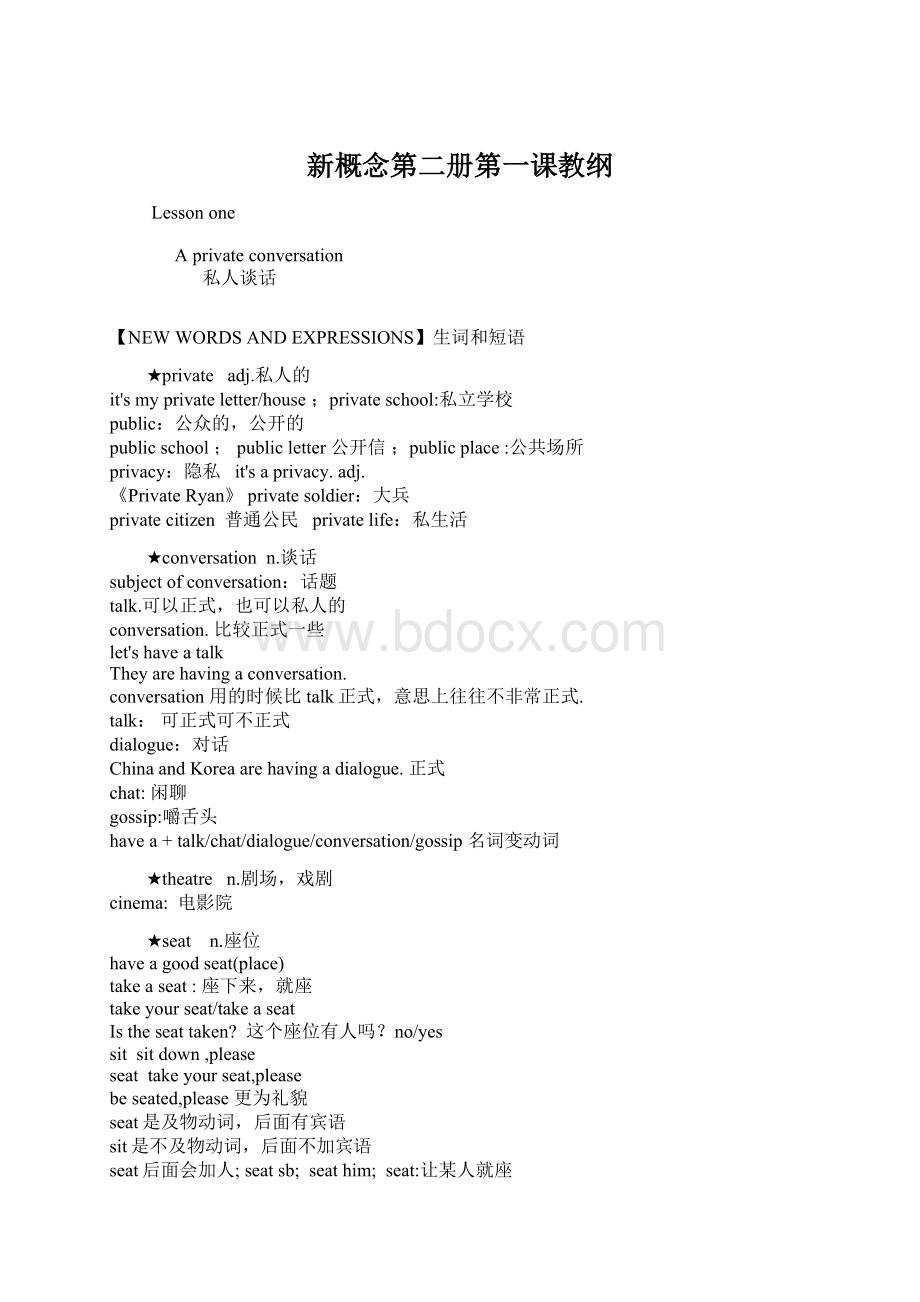新概念第二册第一课教纲Word格式文档下载.docx
《新概念第二册第一课教纲Word格式文档下载.docx》由会员分享,可在线阅读,更多相关《新概念第二册第一课教纲Word格式文档下载.docx(9页珍藏版)》请在冰豆网上搜索。

takeaseat:
座下来,就座
takeyourseat/takeaseat
Istheseattaken?
这个座位有人吗?
no/yes
sit
sitdown,please
seat
takeyourseat,please
beseated,please更为礼貌
seat是及物动词,后面有宾语
sit是不及物动词,后面不加宾语
seat后面会加人;
seatsb;
seathim;
seat:
让某人就座
heissittingthere.
youseathim;
〖语法精粹〗
4.Whenallthosepresent(到场者)_D_hebeganhislecture.(重点题)
A.sit
B.set
C.seated
D.wereseaed
sit,sitdown;
seat,beseated;
takeaseat
★play
n.戏
★loudlyadv.大声的
★angry
adj.生气的
cross=angry;
Iwasangry.Hewascross.
annoyed:
恼火的;
Iwasannoyed.
Iwasangry/cross.
Iwasveryangry.
beblueintheface;
Iamblueintheface.
★angrily
adv.生气的
副词修饰动词
★attention
n.注意
Attention,please.请注意
payattention:
注意
payattentionto:
对什么注意
Youmustpayattentiontothatgril.
payalittleattention:
稍加注意
paymuchattention:
多加注意
paymoreattention:
更多注意
paynoattention
:
不用注意
★bear(bore,borne)
v.容忍
bear,stand
Ican'
tbear/standyou
endure:
忍受,容忍
putupwith:
忍受
Igotdivorced.Icouldnotputupwithhim
bear/stand/endure
忍受的极限在加大
putupwith=bear=stand
bearn.熊
whitebear
bearhog:
热情(热烈)的拥抱
givesbabearhug
★business
n.事
businessman:
生意人
dobusiness:
做生意
gotosomeplaceonbusiness:
因公出差
IwenttoTianjinonbusiness.
thing
可以指事情,也可以指东西
It'
smybusiness私人事情
snoneofyourbusiness
★rudely
adv.无礼地,粗鲁地
rudeadj.
【TEXT】
可配合背诵软件的图片讲解
【课文讲解】
Lastweek
gotothetheatre
seeafilm,gotothecinema
gotothe+地点
表示去某地干嘛
gotothedoctor'
s去看病
gotothedairy
去牛奶店
gotothe+人+'
s表示去这个人开的店
gotothebutcher'
s买肉
gotoschool:
去上学
gotochurch:
去做礼拜
gotohospital(医院):
去看病
gototheGreatWall
gohome;
跟home相连一定表示没有事情可做,回家休息
Iamathome
enjoy,enjoyoneself:
玩的开心
enjoy+sth:
喜欢,从当中得到一种享受
Ilikesomethingverymuch./Ilovesomething.
Ienjoytheclass.
Ienjoythemusic.
Ienjoythebook.
enjoythedinner/film/progeam/game
weresitting:
当时正座在
过去进行时态:
过去的某个时间正在发生的动作
一个故事的背景往往用进行时态描述
I+be+v(ing)
Thegirlwasreadingabookinthegarden.Aboycametoher.
got:
变得,表示一种变化,gotangry
Iam/wasangry是一个事实
Igotangry:
强调变化过程
Itishot.
Itgothot.
got取代be动词,got是一个半联系动词,可以直接加形容词
说话的时候喜欢用缩略.I'
mnot,heisn'
t,theyaren'
t
写的时候会说:
Iamnot,heisnot,theyarenot
Ididn'
tdosth,Ididnotdosth
hear:
听见
hear+人:
听见某人的话
Icouldnothearyou.Begyourpardon?
Icouldn'
thearyou./Icouldn'
thearaword./Icouldn'
tcatchyourword.
thearyouclearly./Icouldn'
tcatchyourwords.
Begyourpardon?
/Icouldn'
turnround:
转头
payanyattention
表示注意,payattention;
对什么加以注意,payattentiontosth
notany=no
Icouldnotbearit./you./thenoise.
thearaword.
美音:
肯定.Ican,否定,Ican'
t,只能根据上下文来定
hearaword,aword等于一句话
Hedidn'
tsayaword.
MayIspeaktoJim?
/MayIhaveawordwithJim?
snoneofyourbusiness./Noneofyourbusiness/It'
smybusiness.
tbearyou.
Thisisprivateconversation!
private:
私人的,不想与别人共享
hearawordofsb(actors)
Keystuctures
关键句型
Summarywriting:
摘要写作
answerthisquestionsinnotmorethan55words.
写作当中的第一步从完整句子开始写起
【KEYSTUCTURES】关键句型
Wordorderinsimplestatements:
简单陈述句的语序
陈述句一定是有主语,有动词,有宾语,有句号
看教材第2页
6
1
2
3
4
5
6
when?
Who?
Action
How?
Where?
When?
Which?
What?
Lastweek
1---主语一般有名词或代词构成
2---谓语由动词充当
3---宾语
4---副词或介词短语,对方式或状态提问,往往做状语Ilikeherverymuch
5---地点状语
6---时间状语可以放在句首或句末
IlikethegirlverymuchinBeijinglastyear.
简单陈述句一定不能少的是主语
6.
Immediatelylefthe.
Heleftimmediately.
13.Thelittleboy;
anapple;
thismorning;
ategreedily;
intheKitchen.
ThelittleboyateanapplegreedilyintheKitchenthismorning.
4
Game;
played;
yesterday;
intheirroom;
thechildren;
quietly
Thechildrenplayedgamesquietlyintheirroomyesterday.
主语——>
动词——>
宾语——>
状语
状语:
放在最前面是副词,方式状语,表示状态/程度的状语,下面是地点,然后是时间
1.主语和动词不能少
2.如果时间和地点连在一起,先放地点,再放时间
如果问何时何地,是一个固定搭配
whenandwhere
【Multiplechoicequestions】多项选择题
Comprehension理解
Strucures
句型
Vocabulary
词汇
(1)...b...
"
Theydidnotpayanyattention"
payattention:
注意(在思想上)
notice:
注意(=see眼睛看)
(4)...
sittingbehind
behind:
在...后面
infrontof:
在...前面(相对静止的概念)
before:
在...前面(+词、句子、一定和时间相连)
above:
在...上面
aheadof:
在...前面(+时间、位置)(动态的行为)
Hearrivedbeforesixo'
clock.
Beforehecameback
Aheadoftime
Hegoesaheadofme.
(5)...c...
how——对一个方式、状态提问
特殊疑问词对后面的答案提问
angry(adj)
how(adv.)——对形容词、副词、介词短语提问
where
——用介词,地点
when
——用介词,时间
why
——用because回答
(7)...d...
any——用在否定句和疑问句中
some——用在肯定句中
none——没有任何东西、没有任何人
Noneknows./Noneofusknows.
not——否定词,要放在非实义动词后面
tpayattention
no——形容词、修饰名词
Idon'
thaveanyfriends./Ihavenofriends.
Ihavenotime./Idon'
thaveanytime.
(11)...
suffer:
遭受,忍受(精神或肉体上)+痛苦
bear:
忍受=stand
Isuffertheheadache.
Heoftensuffersdefeat.
§
Lessontwo
Breakfastorlunch?
【NEWWORDSANDEXPRESSIONS】
★until
prep.直到
直到...才;
直到...为止
后面加(时间状语)从句,前面就是主句
1)Hisfatherdidn'
tdieuntilhecameback.(肯定)
直到他回来,他爸爸才死。
2)Hisfatherwasaliveuntilhecameback.
(否定)
直到他回来为止,他爸爸都是活着的。
到他回来这一点之前,没死:
notdie;
活的:
不加not.
把until作为时间终止线
从句的时间终点之前,这个动作做了还是没做?
做了——肯定;
没做——否定.
Forhe___A(C)___(wait)untilitstoppedraining.
A.
waited
B.didn'
twait
A.leave
B.left
C.didn'
tleave
Istayinbeduntiltwelveo'
tgetupuntil12o'
★outside
adv.外面
作状语
Heiswaitingformeoutside.
Itiscoldoutsid.
★ring(rang.rung)
v.(铃、电话等)响(刺耳的)
Thetelephone(doorbell)isringing.
jingle(bell):
(铃儿)响叮当
给某人打电话:
ringsb.
TomorrowI'
llringyou.
打电话(名):
givesb.aring
remmembertoringme/reembertogivemearing
戒指(名词)
★aunt
n.姑,姨,婶,舅妈
uncle:
叔叔
cousin:
堂兄妹
nephew:
外甥
niece:
外甥女
★repeat
v.重复
同上课
Newwordsandexpressions生词和短语
until
prep.直到
outsideadv.外面
ring
v.(铃、电话等)响
aunt
n.姑,姨,婶,舅母
repeat
v.重复
”
OnSundays:
所有的星期天,每逢星期天
never:
从来不(可以直接用在动词前面)
=not(变成否定句,前面一定要加助动词)
tlikeher.=Ineverlikeher.
因为是上个星期,所以时态不是一般现在时。
lookoutof:
朝窗外看
从...里:
from,outof
dark:
天很黑
Whataday?
What+a+n.——感叹句
Itisterribleday.==>
Whataterribleday!
What+a/an(+a.)+n.(+主语+谓语)
Whataterribleday!
whatagoodgirl(sheis)!
Whataday!
有上下文和一定的语境,才能省略形容词。
justthen:
就在那时
如果不知道对方性别,可以用it取代
Whoareyou?
/Whoisit?
just只会出现在"现在完成时"
bytrain
by直接加交通工具(不能有任何修饰词,复数)
Igooutbybus/ontwobuses.
如果加修饰词,就要换掉by
I'
mcomingtoseeyou.我将要来看你。
用come的现在进行时态becoming表示一般将来
go,comeleave,arrive,land,meet,die,start,return,join...
Dearme:
天哪
Mygod!
Mydear!
【Keystructures】 关键句型
Now,oftenandAlways表示现在和经常发生的动作
Now——现在进行时(说话的当时正在发生,现阶段正在发生)
OftenadAlways——一般现在时
现阶段"
Iamworkingasateacher.
Ido.../hedoes...
Igetup...
一般现在时,是一种习惯,真理,是过去,现在和未来都会发生的事情。
现在还在睡觉
Heisstillsleeping.
频率副词往往放在句子中间,实义动词前,非实义动词后
非实义动词:
1.系动词(be)
2.助动词帮助动词构成时态的(do,does,will,shall,have,had,has)
3.情态动词:
(must,can,may)
p4Exercises
1.areplaying;
"
always"
play;
iskicking"
now"
;
isrunning
2.areyoudoing;
amleaving;
(用进行时态表达将来时:
go,come.leave,arrive
join,return,die,land,meet)
别人用什么时态,你就用什么时态" areyouleaving
come
go(Igotobedhungry.形容词做状语)
(rarely很少) listen
doesn'
twork"
feel
【SpecialDifficulties】难点
What+a/an+a.+n.+主语+谓语
What对名词感叹
3.Heiscausingalotoftrouble
名词:
trouble
主语:
he
动词:
iscausing
What(alotof)trouble(heiscausing)!
【Multiplechoicequestions】
5."
notearly"
late(adj./adv.)
lately(adv.)=recently(howareyougoinglately?
)
A
8.A
look(vi.):
表示看的动作;
后面一定要加介词
see(vt.)
表示看的结果;
后面直接加宾语
watch:
表示观看;
后面直接加宾语,但宾语一定是能够活动的东西
11.D
lunch:
中餐
food
食物
dinner:
正餐
meal
一顿饭
频率副词,放在实义动词前,非实义动词后;
如果即有实义动词又有非实义动词.要放在两个之间
疑问句中副词往往放在主语的后面